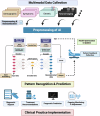Practical AI application in psychiatry: historical review and future directions
- PMID: 40456953
- PMCID: PMC12339366
- DOI: 10.1038/s41380-025-03072-3
Practical AI application in psychiatry: historical review and future directions
Abstract
The integration of artificial intelligence (AI) in mental healthcare holds promise for enhancing diagnostic precision, treatment efficacy, and personalized care. Despite AI's potential to analyze vast datasets and identify subtle patterns, its clinical adoption in psychiatry remains limited. This review critically examines the emerging role of AI in psychiatry, elucidating its utility, challenges, and implications for clinical practice. Through an extensive analysis of the existing literature and empirical evidence, we seek to inform psychiatric stakeholders about both opportunities and obstacles that are presented by AI. We evaluate AI's potential to improve diagnostic accuracy, prognostic performance, and therapeutic interventions. Our pragmatic approach bridges the gap between theoretical advancements and practical implementation, providing valuable insights and actionable recommendations for psychiatric professionals. This article highlights the supportive role of AI, advocating for its judicious integration to enhance patient outcomes while maintaining the human-centric essence of psychiatric practice. By addressing these challenges and fostering collaboration, AI can significantly advance mental healthcare, reduce clinical burdens, and improve patient outcomes.
© 2025. The Author(s).
Conflict of interest statement
Competing interests: The authors declare no competing interests.
Figures




References
-
- Abbasi J, Hswen Y. One day, AI could mean better mental health for all. JAMA. 2024;331:1691–4. - PubMed
-
- Babic B, Gerke S, Evgeniou T, Cohen IG. Beware explanations from AI in health care. Science. 2021;373:284–6. - PubMed
-
- Topol EJ. High-performance medicine: the convergence of human and artificial intelligence. Nat Med. 2019;25:44–56. - PubMed
Publication types
MeSH terms
Grants and funding
LinkOut - more resources
Full Text Sources
Miscellaneous

